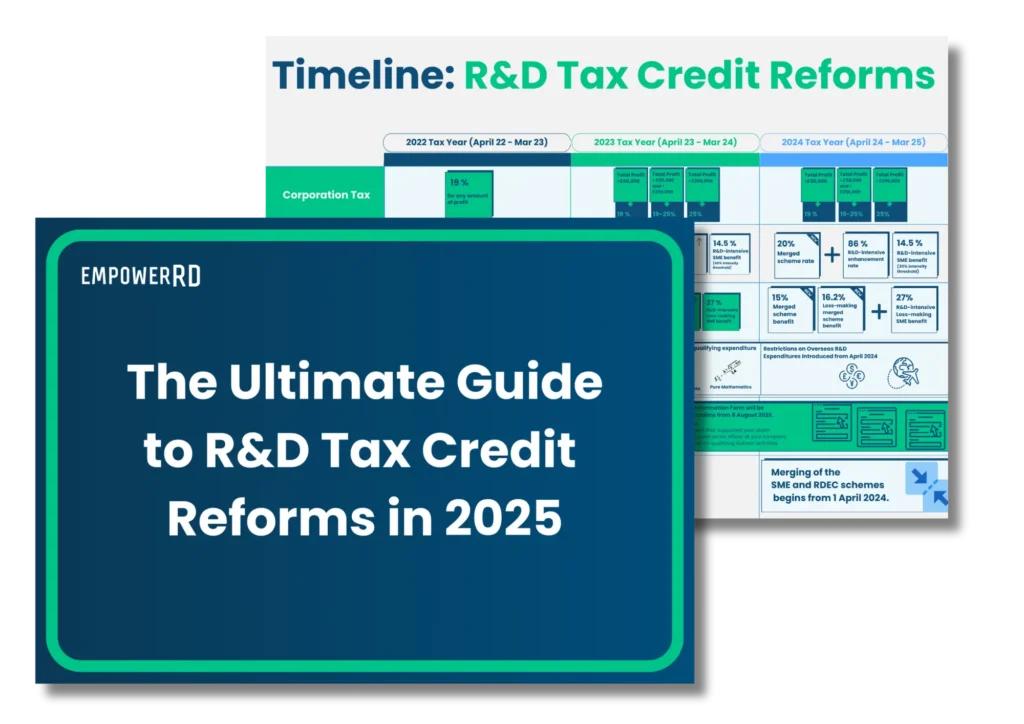As companies grow, the services they use also need to grow with them. The same is true for R&D tax credits. We often find that the companies looking to change providers do so because they’ve outgrown their current providers. In most cases, that will be their accountant, but it can also be a small or a traditional R&D tax credit advisor.
In this article, we detail the tell-tale signs that you’ve outgrown your current R&D tax credit advisor.
The claim takes too much of your tech team’s time
An R&D claim can be divided into two parts. Firstly, there’s the data collection, and secondly, there are the technical narratives. The data collection details the company’s financial position and provides data on R&D costs; the finance or founding team usually handles it. The technical narratives are written accounts of your R&D projects. They explain to HMRC how your tech activities count as R&D and are typically authored or contributed to by your tech team.
Das Verstehen von Quoten und Wahrscheinlichkeiten mit Kasinique
Das Verstehen von Quoten und Wahrscheinlichkeiten ist ein faszinierendes Thema, das oft mit Glücksspiel und Risiko in Verbindung gebracht wird. In unserem Artikel über Kasinique tauchen wir tiefer in die Welt der Quoten und Wahrscheinlichkeiten ein, um zu zeigen, wie sie nicht nur beim Glücksspiel, sondern auch im Alltag eine Rolle spielen. Haben Sie sich schon einmal gefragt, wie Wahrscheinlichkeiten berechnet werden und wie sie unser tägliches Leben beeinflussen?
Wir werden in diesem Beitrag die Grundlagen von Quoten und Wahrscheinlichkeiten erklären, ihre Bedeutung in verschiedenen Bereichen aufzeigen und Ihnen Einblicke geben, wie Sie dieses Wissen nutzen können, um fundierte Entscheidungen zu treffen. Tauchen Sie mit uns in die Welt der Zahlen und Chancen ein und entdecken Sie, wie Kasinique Ihnen helfen kann, die Komplexität von Quoten und Wahrscheinlichkeiten zu verstehen.
Grundlegende Konzepte von Quoten und Wahrscheinlichkeiten
Kasinique ist eine innovative Plattform, die es Spielern ermöglicht, Quoten und Wahrscheinlichkeiten besser zu verstehen. Durch interaktive Grafiken und leicht verständliche Erklärungen wird das Konzept von Quoten und Wahrscheinlichkeiten veranschaulicht. Spieler können auf einfache Weise lernen, wie diese beiden Elemente im Glücksspiel eine Rolle spielen und wie sie ihre Entscheidungen basierend darauf treffen können.
Mit Kasinique können Spieler die Wahrscheinlichkeiten verschiedener Ereignisse berechnen und verstehen, wie sich Quoten auf ihre potenziellen Gewinne auswirken. Diese Informationen sind entscheidend, um fundierte Entscheidungen beim Glücksspiel zu treffen und die Chancen auf einen Gewinn zu maximieren. Kasinique bietet eine benutzerfreundliche Oberfläche, die es Spielern ermöglicht, diese Konzepte leicht zu erfassen.
Durch die Verwendung von Kasinique können Spieler auch lernen, Risiken besser einzuschätzen und Strategien zu entwickeln, um ihr Spiel zu verbessern. Indem sie die Quoten und Wahrscheinlichkeiten verstehen, können sie ihre Einsätze entsprechend anpassen und langfristig erfolgreicher sein. Kasinique bietet eine umfassende Wissensdatenbank, die Spielern dabei hilft, ihr Verständnis für Glücksspielmechaniken zu vertiefen.
Insgesamt ist Kasinique eine wertvolle Ressource für Spieler, die ihr Verständnis von Quoten und Wahrscheinlichkeiten im Glücksspiel vertiefen möchten. Durch die interaktiven Tools und klaren Erklärungen wird es Spielern erleichtert, diese komplexen Konzepte zu erfassen und in ihre Strategien zu integrieren. Mit Kasinique können Spieler ihr Wissen erweitern und ihre Gewinnchancen steigern, was zu einer insgesamt positiveren Spielerfahrung führt.
Die Rolle von Kasinique beim Verständnis von Quoten
Das Verstehen von Quoten und Wahrscheinlichkeiten kann eine Herausforderung sein, besonders für Anfänger im Glücksspiel. Mit Kasinique wird dieser Prozess jedoch einfach und zugänglich. Auf www.kasinique.com können Spieler detaillierte Erklärungen zu Quoten und Wahrscheinlichkeiten finden, die ihnen dabei helfen, fundierte Entscheidungen zu treffen. Durch die klare und verständliche Darstellung wird es selbst Neulingen leicht gemacht, die mathematischen Konzepte hinter den Spielen zu begreifen.
Kasinique bietet eine Vielzahl von Ressourcen und Informationen, die es Spielern ermöglichen, ihre Gewinnchancen zu maximieren. Neben der Erklärung von Quoten und Wahrscheinlichkeiten bietet die Plattform auch Tipps und Strategien, um das Beste aus jedem Spiel herauszuholen. Mit Hilfe von Kasinique können Spieler ihr Verständnis für die Mathematik des Glücksspiels vertiefen und so ihre Erfolgsaussichten verbessern.
Anwendungen von Quoten und Wahrscheinlichkeiten in der Praxis mit Kasinique
Beim Spielen von Kasinique ist es entscheidend, Quoten und Wahrscheinlichkeiten zu verstehen, um fundierte Entscheidungen zu treffen. Quoten geben an, wie viel Geld man gewinnen kann im Verhältnis zum Einsatz. Mit Kasinique können Spieler Quoten schnell und einfach berechnen, um ihre Gewinnchancen zu maximieren. Durch das Verständnis der Quoten können Spieler ihre Einsätze strategisch platzieren und so ihre Gewinnchancen erhöhen.
Wahrscheinlichkeiten spielen ebenfalls eine wichtige Rolle beim Spielen von Kasinique. Sie geben an, wie wahrscheinlich es ist, dass ein bestimmtes Ereignis eintritt. Indem Spieler die Wahrscheinlichkeiten verstehen, können sie Risiken besser einschätzen und ihre Strategien entsprechend anpassen. Kasinique bietet Tools und Ressourcen, um Spielern zu helfen, die Wahrscheinlichkeiten zu interpretieren und ihre Entscheidungen zu rationalisieren.
Mit Kasinique können Spieler ihr Verständnis von Quoten und Wahrscheinlichkeiten verbessern, was ihnen einen klaren Vorteil beim Spielen verschafft. Indem sie die mathematischen Konzepte hinter den Spielen verstehen, können Spieler fundierte Entscheidungen treffen und ihre Gewinnchancen steigern. Kasinique ist eine Plattform, die Spielern dabei hilft, die Komplexität von Glücksspielen zu durchdringen und ihre Fähigkeiten zu verbessern.
Herausforderungen und Lösungsansätze beim Umgang mit Quoten und Wahrscheinlichkeiten
Das Verstehen von Quoten und Wahrscheinlichkeiten ist entscheidend beim Glücksspiel und kann mit Kasinique auf unterhaltsame Weise erlernt werden. Kasinique bietet eine Vielzahl von Spielen, die es den Spielern ermöglichen, Quoten und Wahrscheinlichkeiten in Echtzeit zu erleben. Durch die Interaktion mit verschiedenen Spielen können Spieler ein besseres Verständnis für die Chancen entwickeln und ihre Entscheidungen basierend auf diesen Informationen treffen.
Ein wichtiger Aspekt des Verstehens von Quoten und Wahrscheinlichkeiten ist die Fähigkeit, Risiken einzuschätzen und fundierte Entscheidungen zu treffen. Mit Kasinique können Spieler ihre Fähigkeiten in diesem Bereich verbessern, indem sie die verschiedenen Quoten und Wahrscheinlichkeiten in den Spielen analysieren und darauf reagieren. Dies fördert nicht nur ein verantwortungsbewusstes Spielverhalten, sondern hilft auch dabei, die mathematischen Konzepte hinter den Quoten besser zu verstehen.
Durch die Nutzung von Kasinique können Spieler auch lernen, wie Quoten und Wahrscheinlichkeiten ihre Gewinnchancen beeinflussen. Indem sie verschiedene Strategien ausprobieren und die Auswirkungen auf ihre Gewinne beobachten, können Spieler ein tieferes Verständnis dafür entwickeln, wie sie ihre Einsätze platzieren sollten, um langfristig erfolgreich zu sein. Dieses praktische Lernen macht den Prozess des Verstehens von Quoten und Wahrscheinlichkeiten greifbar und spannend.
Insgesamt bietet Kasinique eine interaktive und lehrreiche Plattform, um das Verständnis von Quoten und Wahrscheinlichkeiten zu vertiefen. Durch die Kombination von Spaß und Bildung können Spieler ihre Fähigkeiten im Umgang mit Quoten und Wahrscheinlichkeiten verbessern und gleichzeitig ein aufregendes Spielerlebnis genießen. Mit Kasinique wird das Lernen zu einem spannenden Abenteuer, das Spielern dabei hilft, ihre Gewinnchancen zu maximieren und gleichzeitig verantwortungsbewusst zu spielen.
Mit Kasinique wird das Verstehen von Quoten und Wahrscheinlichkeiten zu einem spannenden Erlebnis. Durch interaktive Spiele und klare Erklärungen wird komplexes mathematisches Denken auf spielerische Weise vermittelt. Die Vielfalt an Spielen und Herausforderungen bietet eine unterhaltsame Möglichkeit, sich mit mathematischen Konzepten vertraut zu machen. Kasinique ist nicht nur für Glücksspiel-Enthusiasten, sondern für jeden, der sein Verständnis für Quoten und Wahrscheinlichkeiten verbessern möchte, eine empfehlenswerte Plattform. Tauchen Sie ein in die Welt von Kasinique und entdecken Sie, wie einfach es sein kann, mathematische Konzepte zu begreifen und anzuwenden.
Accountants and a smaller R&D tax credit advisor may not have the expertise in-house to help your team with this section. In that case, the majority of the work will fall onto your senior tech team.
What’s more, each year, you will likely claim for an increased number of R&D projects. Therefore, each year you will need to write an increasing number of technical narratives. If your provider does not support your tech team, they will likely find this work significantly taxing.
At EmpowerRD, we combine staff narrative writers with an intelligent online claims platform. Our platform will help your tech team to identify the raw information needed to help build the narratives. And once they’ve used the platform to identify this information, our writers will build those contributions into valid technical narratives for HMRC.
The platform also allows your tech team to record the information needed for the narratives throughout the year. This “in-year” collection prevents your tech team from needing to hazily remember their work from 11 months ago when you submit your claim.
Project managing the claim takes too much time
Similarly, as your claim grows in size and complexity, you will begin to engage with more stakeholders, both internally and externally. While your first claim may have been a collaboration between your CEO and CTO, your later claims can involve multiple parties in your finance team, your engineering team, your product team, your accountant, multiple subcontractors, and your management team.
As the claim grows, so too does the need to coordinate these parties effectively. Often that will fall onto a senior member of the finance team, and without much assistance from their claim provider, that work can become seriously burdensome. Indeed, our client Cognism had to switch to us because this coordination effort became too challenging to manage.
At EmpowerRD, we design our claims platform to aid this coordination process. Each stakeholder receives a login with customisable permissions. The coordinator can track the progress of the claim using the activity dashboard. At the same time, our claims team will also help ensure your claim’s robustness before sending it for review.
The claim takes too long to compile and submit
Generally speaking, a claim shouldn’t take longer than a couple of weeks to create and submit. Traditional advisors may gather claim data by interviewing your team over calls, lengthy email chains, and spreadsheets, which can quickly drain your team’s time.
Equally, as the claim grows in size and complexity, the work can drag on if the provider doesn’t have the tools to manage this. We’ve heard of claims being worked on for over 4 months.
You claim too little credit
This can be hard to know. Once the claim is submitted and you receive no enquiry, then any amount of credit can seem like a boost to your finances. However, there are significant differences between providers. This is especially true for generalist accountants versus claim specialists.
Inevitably if your expertise is split across various services, then the standard of delivery for one of those services will not match a specialist. Indeed, when we worked through Bloom & Wild’s claim, we realised they had been underclaiming significantly. We then retrospectively looked at their past claims and were able to secure 290% more credit.
HMRC launch an enquiry
HMRC launching an enquiry is perhaps the most apparent sign! In most cases, enquiries occur when an accountant or other non-specialist completes the claim. Enquiries typically take 6-12 months to resolve and can become a significant drain on resources.
Estimates suggest that the enquiry rate for R&D claims is around 5%, although HMRC has not released this data, so it can’t be guaranteed. More certainly, HMRC has in 2021 more than doubled the number of claims inspectors looking at R&D claims and has also expanded their random enquiry programme. We have seen an increase of customers coming to us as a result of an enquiry this year. HMRC implemented these measures after a critical Auditor General’s report in 2020.












